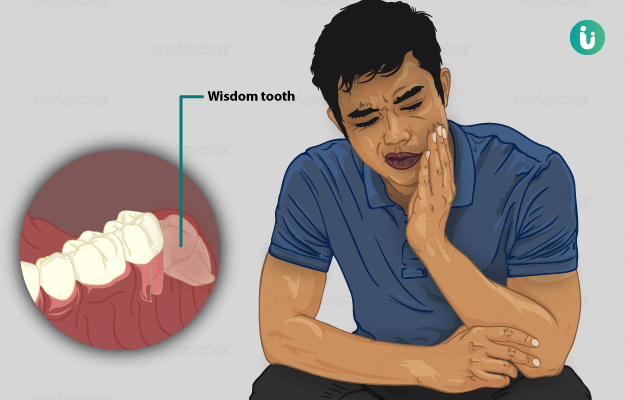What is wisdom tooth pain?
The molar teeth at the back of the mouth that erupt last are the wisdom teeth. They usually emerge in the late teens or early twenties. There are ideally four wisdom teeth, two in the upper jaw and two in the lower jaw, but some people may have less, more or even none of them depending upon certain factors which affect eruption. A pain in the wisdom tooth can occur due to many reasons, the most common being impaction and infection.
What are its main signs and symptoms?
The signs and symptoms associated with wisdom tooth pain are:
- Cysts causing swelling
- Inflammation and redness of the gum near the tooth
- Pus from the gum
- Tooth decay
- Bad breath
- Fever
- Difficulty in swallowing
- Sore and swollen lymph nodes underneath the jaw
What are the main causes?
The following are the main causes of wisdom tooth pain:
- Insufficient space in the jaw can hamper the teeth from erupting properly and can cause pain.
- Improper eruption may cause difficulty in brushing, accumulation of food in between the teeth leading to bacterial growth, infections and pain.
How is it diagnosed and treated?
One should consult a dentist in case of severe pain in the wisdom tooth. The dentist will examine your teeth, mouth and gums to identify the cause of the pain. An X-ray is generally taken to get a better and clear view of the condition of the molar teeth.
The exact treatment of a toothache depends on the cause, but the dentist may recommend the following common treatment options for the pain:
- Antibiotics to treat infections
- Over-the-counter pain-relieving medications
- Antiseptic mouthwash
- Surgical removal of a wisdom tooth is recommended if other treatment options do not work and pain persists
- In cases of severe infection, drainage of pus from the swelling is also a part of the treatment plan.
Consulting the dentist immediately and receiving prompt treatment for the wisdom tooth pain can help in preventing bacterial growth and further spread of infections.

 Doctors for Wisdom Tooth Pain
Doctors for Wisdom Tooth Pain 


















